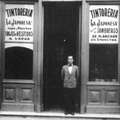On February 9, 2009, the prominent Nikkei businessman Carlos Kasuga shared his wisdom in a presentation titled “How to be Well” in the auditorium of the Japanese Embassy’s Cultural and Information Center. The Argentine Nikkei Center and the Argentine Center of Former Fellows of Japan organized the event. We present here the concepts relayed to the many folks who attended the conference in the cultural wing of the Japanese Embassy.
“I am the son of Japanese immigrants who, during the 1930s, had the foresight to choose this land. I am of Japanese descent but proudly Mexican,” were the first words that Carlos Kasuga expressed at the conference, and he did so with emotion and conviction. He added, “This allowed me to live in a Japanese home, speak Japanese, and be raised with Japanese costumes and traditions, but I also grew up in the heart of Mexico.”
Each word that the prominent businessman expresses gives pause for reflection and learning. And it’s not a coincidence that his ideas are aimed primarily at the youth: “My goal in life has been to help young people, encourage them to study and take control of their lives, [so] that they become sources of employment for many people, which is so lacking in Latin America.”
Carlos Kasuga argues that in order to have a first-class company, family, or institution, a person must first make a commitment to himself and then to others, thus fashioning other “high quality people.”
In order to accomplish this, Kasuga suggests four steps: “The good you,” “Do everything well,” “well-being,” and “having it good.”
The Good You
“We ought to be punctual, honest, hard-working, disciplined, and loving…The fundamental principle is respect. If you can’t respect yourself, at least be respectful of others…for example, if you happen to find a ring that isn’t yours, it has to belong to somebody; go find that person and return the ring!…If you find a wallet that doesn’t belong to you, it has to belong to somebody…if you find a woman at a party and she is not your date, she must be with somebody…”
Do Everything Well
"Everything you do, do it well…if you are going to wake up, do it well; if you are going to get dressed, do it well; if you are going to say goodbye to your family, do it well as if it was going to be the last time…do everything thing well.” Those who give more than they receive—to their families, their children, their co-workers, their employees, to society—will arrive at the third step: well-being.
Well-Being
"This step is synonymous with happiness, because you gave the best of yourself to people with whom you had the good fortune of meeting today.”
Having it Good
“Keep in mind the following: don’t expect to have it good so quickly and easily without doing it well, much less without feeling good about it. Having it good is the result of developing the three previous steps: the good you, doing it well, and being well.”
The Nikkei
There is also space to define the Nikkei: “We are people that have 120% of what is best about Japan and what is best about where we were born…that is to say, 60% Japanese and 60% of the country where we were born. We are minor ambassadors for Japan in the country where we were born and continue to reside. In the same way, we are ambassadors to Japan for our own countries.”
Education
Carlos Kasuga discussed the importance of education: “My father taught me that if you want to be rich, and if you want those who around you also to be rich, then sow the seeds of education. In Latin America we seem to worry only about education in terms of knowledge, grades, etc. What we lack, however, is a formative education, that is, a value-laden education. Moreover, if our governments cannot pay teachers more money, it is our obligation to provide them with moral salaries, a moral salary of gratitude, of recognition, [and] of profound appreciation.”
Cleanliness
“Another problem is the lack of hygiene, of cleanliness. We ought to teach our children, our people, our employees, our co-workers, that cleanliness is the noblest virtue for human beings. It is very common to see businessmen, executives, directors, bosses who have their own private bathrooms, lighted mirrors, perfumed soaps, white towels…meanwhile the workers’ bathroom is truly a pigsty…Do you think that workers have no dignity, no feelings, no pride? When you see such differences, [it is easy to understand why] workers are unable to identify with their companies.”
Good example
“Bosses, executive directors, businessmen, we all write rules and regulations, such as those that penalize workers who arrive ten minutes late. How many times does the big-time executive arrive in his BMW one hour late for work and nobody says anything. Meanwhile the poor worker who gets up early, walks eight blocks, takes the bus after waiting ten minutes, has to deal with the heat and the discomfort of being in a packed bus, and through no fault of his own arrives one minute late and gets disciplined for it! How do you think the worker feels? Rage, injustice, and impotence are surely some of the feelings that the worker harbors inside. A good boss, a good director, a good businessman ought to be the first to arrive and the last to leave…the example is quite telling [because] it invites admiration, it is what fosters discipline in people, in a company, in a nation…[and it] sets a good example.”
Values
“When I was in college majoring in accounting, I would go to campus early. On the way I would buy a newspaper off the streets from young people. I’d give them a 100 peso bill, although the paper only cost 50 cents; most didn’t have the $99.50 in change that they owed me, so I’d tell them that I’d come by again in the afternoon to pick up my change. Many never gave me my change, but those who did return the money are those who today have a future; they are today’s executives and directors in my company who are well-off, economically speaking, and who enjoy all the comforts of life. For that reason I always say that everything is possible in Latin America when one receives a values-laden education.
Why would you want in your company an accountant, an engineer, or a lawyer with two master’s degrees if he or she is not honest, not punctual, and not a team player? Much later you will discover many problems in your company. Values are priceless. But that’s what happens with human beings and with big companies.
Responsibility and Effort
We are used to listening to our workers, students, and children say things like: It broke, or I fell down, or it’s lost…but when you ask who did it, nobody wants to take responsibility.
Another example: When you ask someone, “Why didn’t you learn English? And the person responds: They didn’t teach me it. The answer should be: I didn’t want to learn the language.”
If you want to be free, if you want soar to new heights, if you want to succeed in life, you are going to have to stay up late many nights, sacrifice weekends, and push yourself.
If you wait around for the government to give it to you, if you wait for your boss or for someone else to give it to you, I tell you now…congratulations because you are living the life of a circus elephant, doing the same thing everyday.
Similar to religion
Regarding religion, Japan and Latin America are different. In Japan the faithful go to the temples to make offerings, but in this side of the world [Latin America] the faithful go to church to ask and wait. This repeats itself at the company level: Latin American unions present a list of requests (higher salaries, more vacation time, better bonuses, etc.), meanwhile the Japanese unions present a list of things that they are offering (for example, we offer to lower the error margin, we offer increased production in less time, etc…objectives that lead to actual results, and it all ends by awarding workers with better salaries, vacations, and bonuses, among other things), what a small but important difference!”
“Sooner or later the successful person in this world is the one who knows how to give and not ask. As such, we can say the person who fulfills his or her obligations and gives more than he or she can, transforms the world into a paradise. On the other hand, the person who only knows how to ask for things or demand things, transforms the world into a hell. It’s best to remember that we should do things with kimochi, that is, we should do things with feeling, with heart.”
Principles of nature
“In Japan people are raised with the principles of nature. They compare the seasons of the year with different stages of life: Spring is the stage from birth to age twenty. During this period you grow physically, morally, and spiritually, with an eye toward arriving at one’s full potential. Summer is the time between ages 20 and 40. It’s an active time with marriage, kids, work, leisure time, etc. Fall takes place between the ages of 40 and 60 when the body undergoes changes, emotions too, and we realize that we are getting older. Winter covers the period from 60 years of age and older. We should arrive at this stage in good health and with a good attitude, not to mention with a good retirement plan.
Don Carlos ends his presentation with much emotion, recounting a story that his father told him when he was a kid:
“There once was a beautiful forest where many small animals lived. Suddenly, the forest caught on fire and all the little animals had to leave. One small sparrow stayed behind, however. He went to the river, soaked his wings in the water, flew above the flames and tried to put out the fire by releasing one or two small drops. An elephant saw what was happening and shouted: Little sparrow, don’t be a fool! Run away and save yourself like the rest of us! Don’t you see that you are going to burn?
The little sparrow turned around and said “No! This forest has given me everything: my family, food to eat, my friends, but above all, it has given me happiness. I don’t care if I die. Out of simple loyalty I am going to try to save the forest.
The little sparrow kept repeating his actions: he would go to the river, wet his wings, and fly over the fire and release one or two drops over the flames.
The gods were moved by the little sparrow’s actions and sent a huge thunderstorm that put out the fire.
The forest returned to flourish and bloom. All the little animals returned to their homes in the forest and were happy, even happier than ever before.
Kasuga reflects for a moment and says:
“Perhaps your country is experiencing an economic, social, or political fire. I urge each of you to become like this little sparrow, and that every day you leave behind one or two drops of sweat, of hard work, of studying hard…and if you do, Argentina will thank you and God will bless you.”
© 2009 Ricardo G. Hokama





